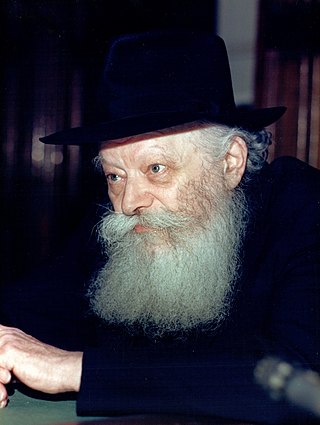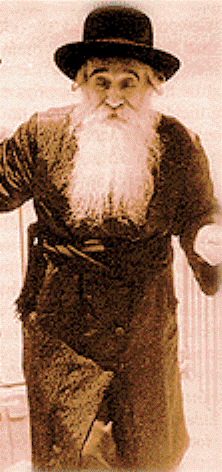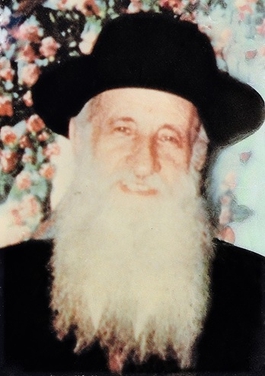Related Research Articles

Menachem Mendel Schneerson, known to adherents of the Chabad-Lubavitch movement as the Lubavitcher Rebbe or simply the Rebbe, was a Russian-American Orthodox rabbi and the 7th, final and current Rebbe of the Lubavitch Hasidic dynasty. He is considered one of the most influential Jewish leaders of the 20th century.

Aharon Kotler was an Orthodox Jewish rabbi and a prominent leader of Orthodox Judaism in Lithuania and the United States; the latter being where he founded Beth Medrash Govoha in Lakewood Township, New Jersey.

Aleksander is a Polish Hasidic dynasty originating from the city of Aleksandrow Lodzki, Poland, where it was founded by Grand Rabbi Yechiel Denciger (1828–1894). Aleksander is a branch of Vurka, as Shraga Fayvel Danciger was a leading disciple of Rabbi Israel Yitzhak Kalish of Vurka. Prior to the Holocaust, Aleksander was the second to largest Hasidic group in Poland. They attracted artisans, merchants and water carriers rather than elite Talmudic scholars and richer people who were attracted to Ger. Like the rest of Polish Jewry, almost all of Aleksander hasidim were murdered in the Holocaust. Between the world wars, Hasidic Jews from all over flocked to the small village of Aleksander to spend the holiest days of the Jewish year in the presence of their spiritual leader, their rebbe, Rabbi Yitzchak Menachem Danciger (1879–1942). The Rebbe of Aleksander attempted to remain neutral in political issues while emphasizing communal prayer and the study of Torah. He was murdered by the Germans on September 5, 1942, eight days before Rosh Hashana, at Treblinka extermination camp. Today, Aleksander has emerged from the ashes of the Holocaust and continues growing in numbers in small communities in America, Europe and Israel.

Benjamin Brafman is an American criminal defense attorney and founder of the Manhattan-based law firm Brafman & Associates. Brafman is known for representing many high-profile defendants, including celebrities, accused Mafia members, and political figures.

Boyan is a Hasidic dynasty named after the town of Boiany in the historic region of Bukovina, now in Ukraine. The Hasidut is headquartered in Jerusalem, with communities in Beitar Ilit, Bnei Brak, Manchester, Australia, Beit Shemesh, London, Antwerp, Manhattan, Brooklyn, Los Angeles, Monsey, Lakewood, and Atlanta. Boyan is one of the branches of the Ruzhiner dynasty, together with Bohush, Chortkov, Husiatyn, Sadigura, Kapishnitz, Vaslui and Shtefanesht.
Shraga Simmons is an Orthodox Jewish rabbi, journalist, filmmaker, brand builder and leader in Torah-themed marketing. He is the co-founder of Aish.com, the educational website and co-founder of HonestReporting, the pro-Israel media watch group. He is also founder and director of the online Torah academy JewishPathways.com.

Kalonimus Kalman Szapiro, was the Grand Rabbi of Piaseczno, Poland, who authored a number of works and was murdered by the Nazis during the Holocaust. He is best remembered for a series of homilies on parshah that were delivered almost every Shabbat during the time he spent with his students in the Warsaw ghetto between the years 1939 and 1942. Shortly after the final entry in this series of meditations, the entire community in the ghetto was sent to the gas chambers in Treblinka. This work is collected under the title Esh Kodesh.

Menachem Z. Rosensaft is an attorney in New York and the founding chairman of the International Network of Children of Jewish Holocaust Survivors. He has been described on the front page of The New York Times as one of the most prominent of the survivors' sons and daughters. He has served as national president of the Labor Zionist Alliance, and was active in the early stages of the Israeli-Palestinian peace process. As psychologist Eva Fogelman has written: "Menachem Rosensaft's moral voice has gone beyond the responsibility he felt as a child of survivors to remember and educate. He felt the need to promote peace and a tolerant State of Israel as well. He wanted to bring to justice Nazi war criminals, to fight racism and bigotry, and to work toward the continuity of the Jewish people".

Old Broadway Synagogue, officially Chevra Talmud Torah Anshei Marovi, is an Orthodox Jewish synagogue located at 15 Old Broadway, in the Manhattanville neighborhood of Harlem, Manhattan, in New York City, New York, United States. The congregation practises in the Ashkenazi rite.
The Spinka financial controversy is a case in which five Spinka charitable organisations under the auspices of Grand Rabbi Naftali Tzvi Weisz, the Spinka Rebbe of Boro Park, as well as Weisz himself, his personal assistant, and five others were charged with various counts of tax fraud and money laundering. Their indictment alleges that the five charities were used to launder money and to avoid payment of tax on taxable income by issuing fraudulent receipts for bogus charitable contributions, and charging fees for transfers of funds. Among those charged are four men from Los Angeles, California and two from Tel Aviv. These include a diamond merchant, a businessman, and an attorney. The five Spinka charitable organizations are Yeshiva Imrei Yosef, Yeshivath Spinka, Central Rabbinical Seminary, Machne Sva Rotzohn, and Mesivta Imrei Yosef Spinka, all based in Brooklyn.

Kesher Israel, also known as the Georgetown Synagogue, is a Modern Orthodox synagogue located in the Georgetown neighborhood of Washington, D.C. The congregation was founded in 1911 and its worshipers have included prominent politicians, diplomats, jurists, journalists, and authors.

Congregation Beth Israel is a Modern Orthodox synagogue located at 4004 West Esplanade Avenue, Metairie, a suburb of New Orleans, Louisiana, in the United States.

Kiryat Unsdorf, also known as Sorotzkin, after its main street, is a Haredi Jewish neighborhood in Jerusalem. It is located along the northern edge of the mountain plateau on which central Jerusalem lies. Constructed between 1970 and 1985, Unsdorf is home to several landmark educational centers. A large percentage of residents are American or British-born.

Congregation Kol Ami is a Reform Jewish congregation and synagogue in Frederick, Maryland, in the United States.

Mordechai Shlomo Friedman, sometimes called Solomon Mordecai Friedman, was the Boyaner Rebbe of New York for over 40 years. In 1927 he left Europe to become one of the first Hasidic Rebbes in America, establishing his court on the Lower East Side of New York City and attracting many American Jewish youth with his charismatic and warm personality. He also played a role in American Jewish leadership with positions on Agudath Israel of America, the Moetzes Gedolei HaTorah, and Holocaust rescue organizations. In 1957 he built the flagship Ruzhiner yeshiva, Tiferet Yisroel, at the top of Malkhei Yisrael Street in Jerusalem.

Radomsk is a hasidic dynasty named after the town of Radomsko in Łódź province, south-central Poland. The dynasty was founded in 1843 by Shlomo Hakohen Rabinowicz. His son, grandson and great-grandson also led the dynasty, which had thousands of followers. On the eve of World War II, Radomsk was the third largest Hasidic dynasty in Poland, after Ger and Alexander.

Avraham Kalmanowitz was an Orthodox rabbi and rosh yeshiva (dean) of the Mir yeshiva in Brooklyn, New York from 1946 to 1964. Born in Russian empire, he served as rabbi of several Eastern European Jewish communities and escaped to the United States in 1940 following the German occupation of Poland. In the U.S. he was an activist for the rescue of the millions of Jews trapped in Nazi-ruled Europe and in the Soviet Union. He arranged the successful transfer of the entire Mir yeshiva from Lithuania to Shanghai, providing for its support for five years, and obtaining visas and travel fare to bring all 250 students and faculty to America after World War II. He established the U.S. branch of the Mir in 1946. In the 1950s he aided North African and Syrian Jewish youth suffering from persecution and pogroms, and successfully lobbied for the passage of a bill granting "endangered refugee status" to Jewish emigrants from Arab lands.

The Rabbi Dr. I. Goldstein Synagogue is a synagogue on the Edmond J. Safra Givat Ram campus of the Hebrew University in Israel named in honor of Rabbi Israel Goldstein, an American-born Israeli rabbi, author, and Zionist leader. Designed by two Israeli architects—the German-born Heinrich Heinz Rau and the Brazilian-born David Resnick—it has been listed as one of the "ten most beautiful synagogues in Israel," and called "without a doubt, a landmark in local architecture."

Inauguration of a Torah scroll is a ceremony in which one or more Torah scrolls are installed in a synagogue, or in the sanctuary or study hall of a yeshiva, rabbinical college, university campus, nursing home, military base, or other institution, for use during prayer services. The inauguration ceremony is held for new and restored scrolls alike, as well as for the transfer of Torah scrolls from one sanctuary to another.
The city of Cumberland, Maryland is home to a small and declining but historically significant Jewish community. The city is home to a single synagogue, B'er Chayim Temple, one of the oldest synagogues in the United States. Cumberland has had a Jewish presence since the early 1800s. The community was largest prior to the 1960s, but has declined in number over the decades. Historically, the Jewish community in Cumberland maintained several synagogues, a Jewish cemetery, and a Hebrew school. By 2019, Cumberland's Jewish community had its lowest population point since the early 1900s.
References
- 1 2 "Founder Of "Save-A-Torah" Charity Sentenced In Manhattan Federal Court To 51 Months In Prison For Defrauding The Charity And Its Donors" (Press release). U.S. Justice Department South District of New York. October 11, 2012. Retrieved January 4, 2024.
- 1 2 3 "Inmate number search: 65614-054". Federal Bureau of Prisons. U.S. Government. n.d.
- 1 2 Lunden, James (August 25, 2011). "Rabbi Indicted In Torah Scam". Washington Post . Retrieved January 4, 2024.
- 1 2 3 4 5 6 7 Moynihan, Colin (February 2, 2012). "Rabbi Admits Torah Tales Were a Fraud". The New York Times . Retrieved February 4, 2012.
- 1 2 3 4 5 "'Jewish Indiana Jones' admits Torah fraud". BBC News . United Kingdom. February 3, 2012. Retrieved February 4, 2012.
- ↑ "Image gallery: Saving the Torah". Washington Post . January 22, 2010. Retrieved January 4, 2024.
- 1 2 Wexler, Martha; Lunden, Jeff (January 31, 2010). "Rabbi to the Rescue: Menachem Youlus is called the Indiana Jones of Torah recovery and restoration. But there are doubts about his thrilling tales". The Washington Post . Retrieved February 4, 2012.
- ↑ "Home page". Save a Torah. Archived from the original on July 28, 2011. Retrieved February 5, 2014.
- ↑ Shaver, Katherine (September 24, 2004). "A Mission To Salvage Holy Message: Wheaton Rabbi Scours World for Torahs Buried, Hidden During Holocaust". Washington Post . p. B01.
- ↑ "Resettled Torahs Article". Save a Torah. Archived from the original on July 28, 2011. Retrieved February 5, 2014.
- ↑ Tabachnick, Toby (February 9, 2010). "Local Torah buyer debates scroll's authenticity". Jewish Chronicle . Pittsburgh. Retrieved January 4, 2024.
- ↑ Herzfeld, Rabbi Shmuel (June 2008). "Auschwitz Torah - A synagogue honors a Torah saved from the Holocaust". Philadelphia Jewish Voice. No. 35. Retrieved January 4, 2024.
- 1 2 Barron, James (April 14, 2010). "Two Torahs, Two Holocaust Stories and One Big Question" . New York Times .
- ↑ Barron, James (August 24, 2011). "Rabbi Fabricated Swashbuckling Tales of Saving Holocaust Torahs, Prosecutors Say". New York Times .
- ↑ Wexler, Martha; Lunden, Jeff (February 3, 2012). "Maryland Rabbi Pleads Guilty to Fraud in Torah Scheme". Washington Post .
- ↑ "Rabbi Fabricated Swashbuckling Tales of Saving Holocaust Torahs, Prosecutors Say". New York Times . August 25, 2011.
- 1 2 Gearty, Robert; Connor, Tracy (February 2, 2012). "'Jewish Indiana Jones' Rabbi Menachem Youlus admits to Torah scam and faces jail". New York Daily News . Retrieved February 4, 2012.
- ↑ "Uncovering the fraud of Youlus' "rescued" Torahs". Southern Jewish Life Magazine. November 5, 2012. Retrieved January 4, 2024.
- ↑ "Maryland pact gags Save A Torah under threat of penalty". The Jewish Chronicle .
- ↑ Wexler, Martha; Lunden, Jeff (October 11, 2012). "Maryland rabbi who peddled fake Holocaust Torahs sentenced to four years for fraud". Washington Post .
- ↑ Weiser, Benjamin (October 11, 2012). "Torah Fraud Earns Rabbi Prison Term". New York Times .
- ↑ "Rabbi Menachem Youlus". Peacemaker Award. Olender Foundation. 2005.